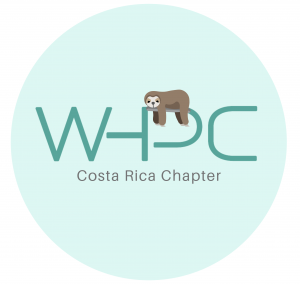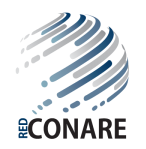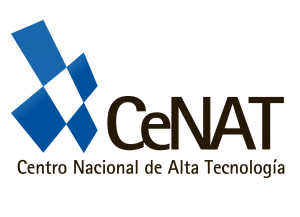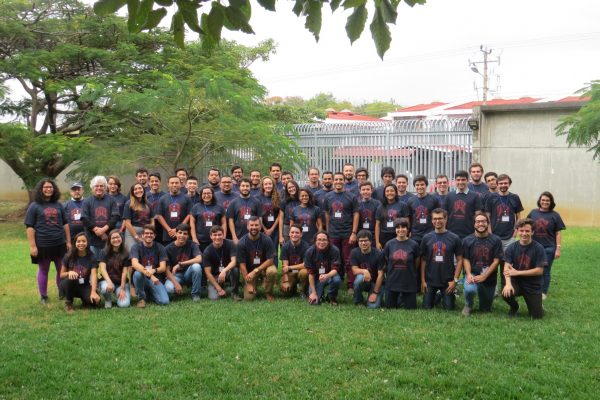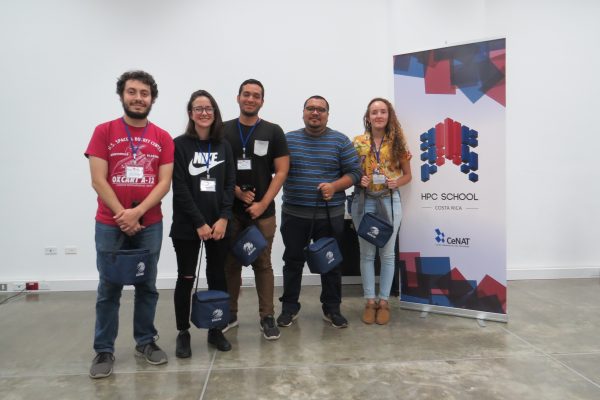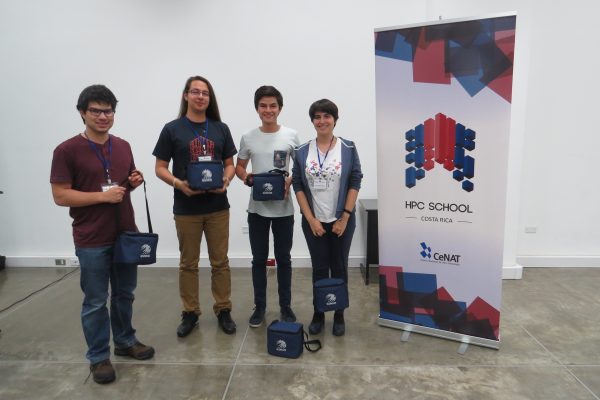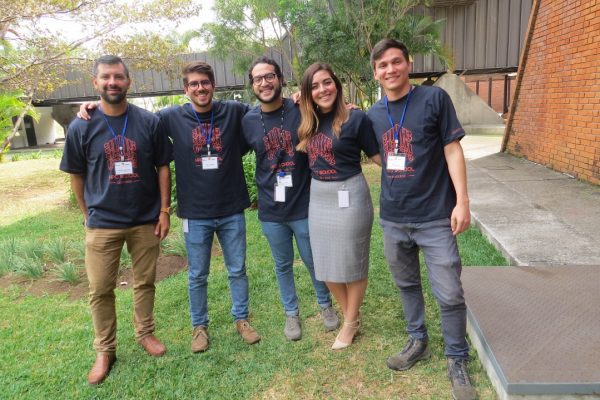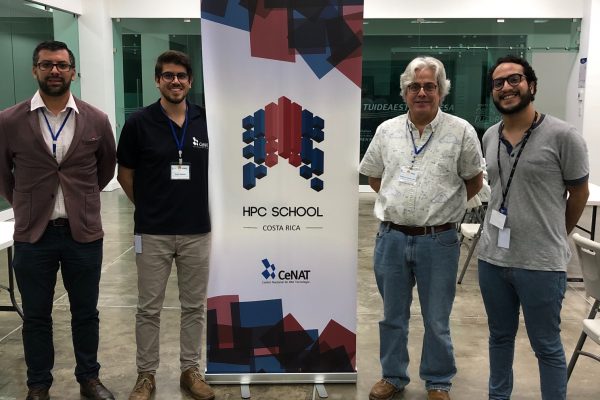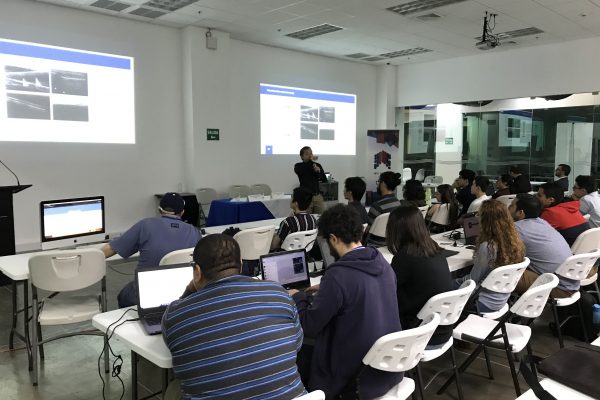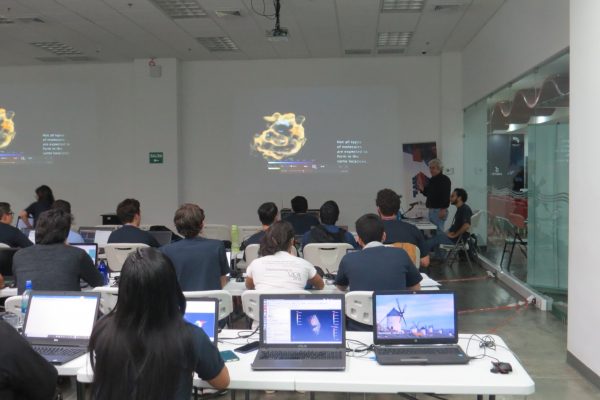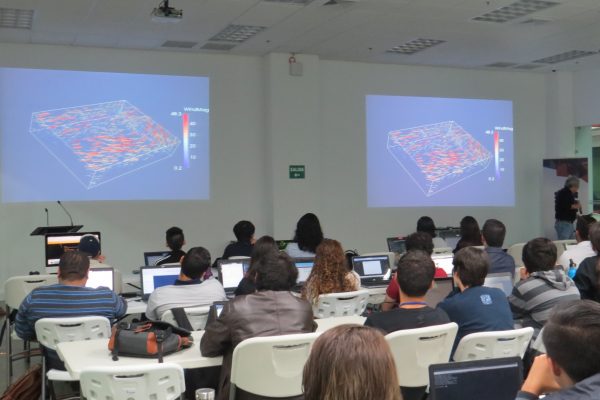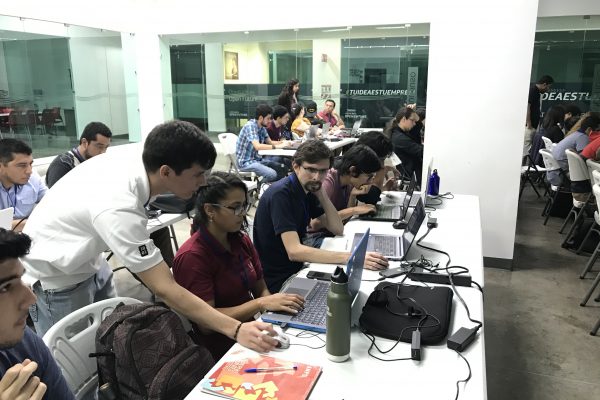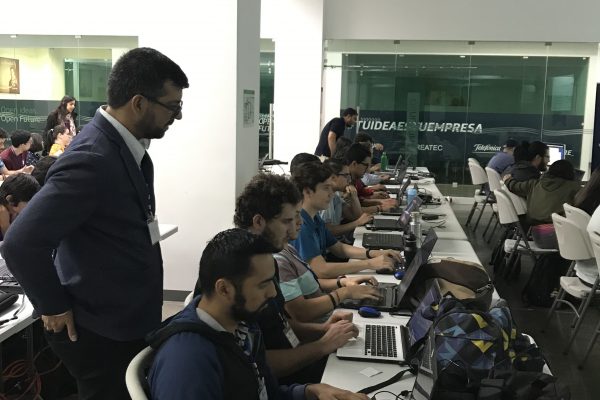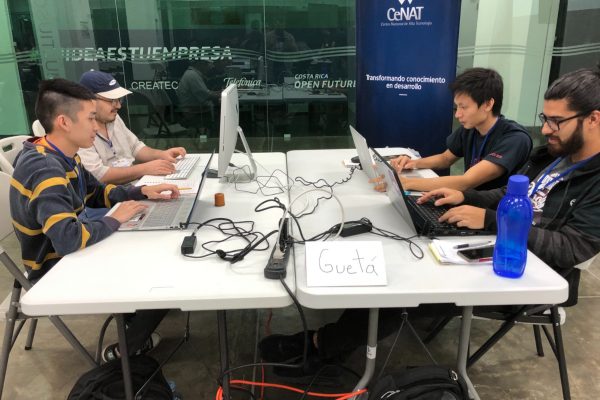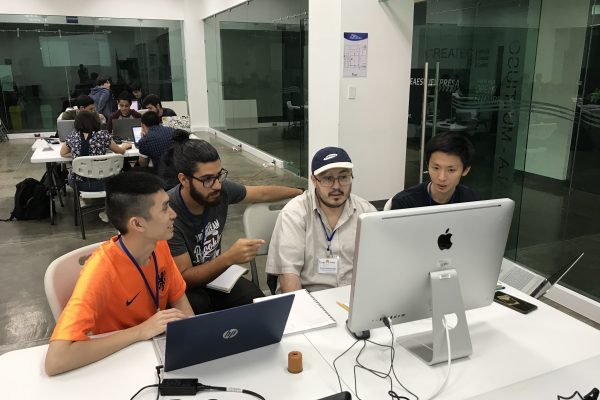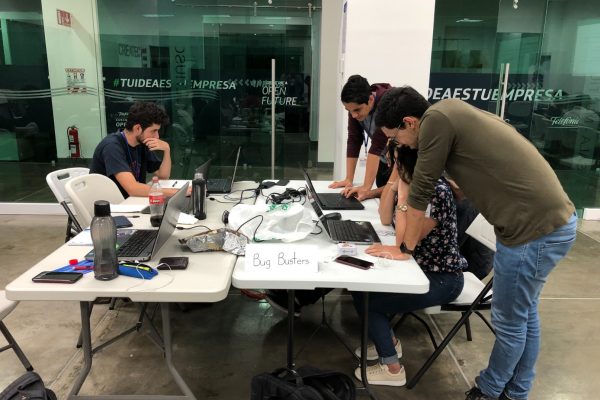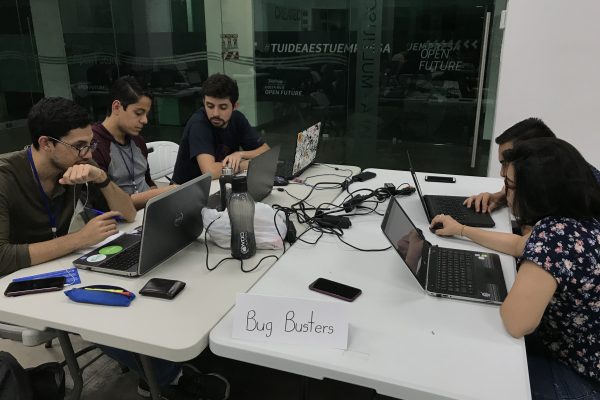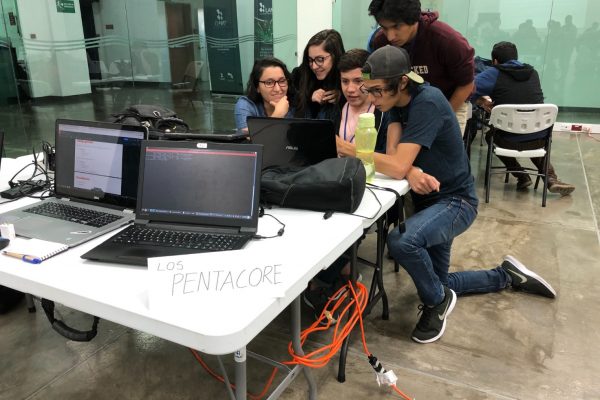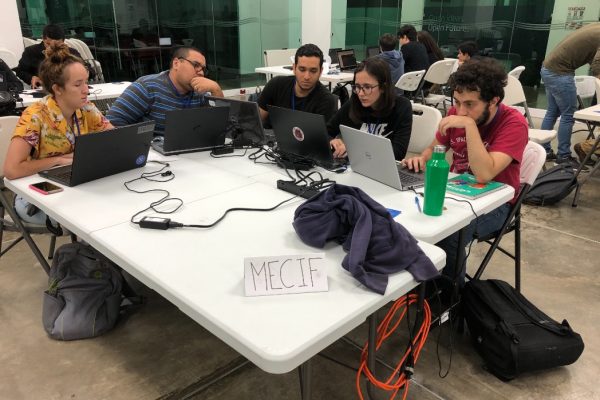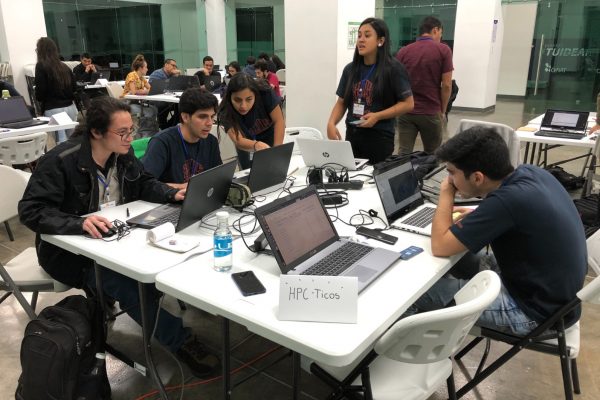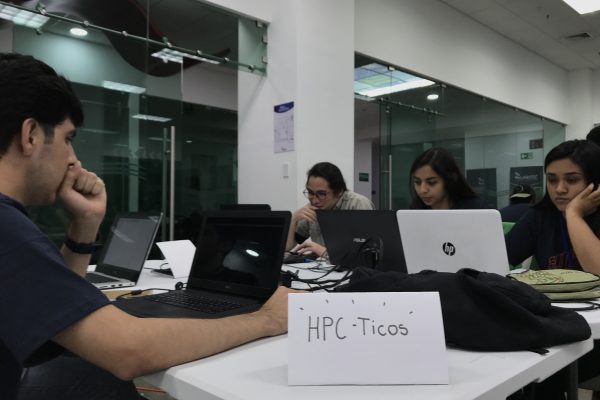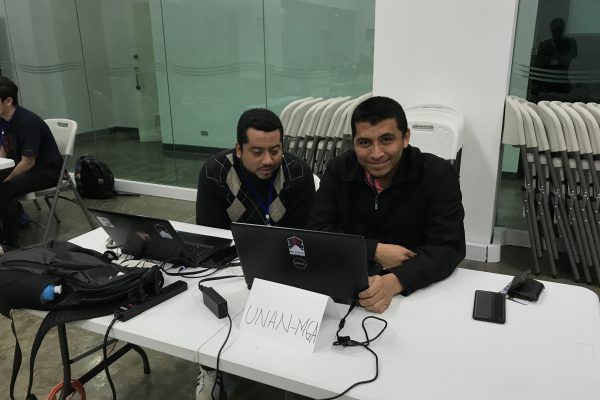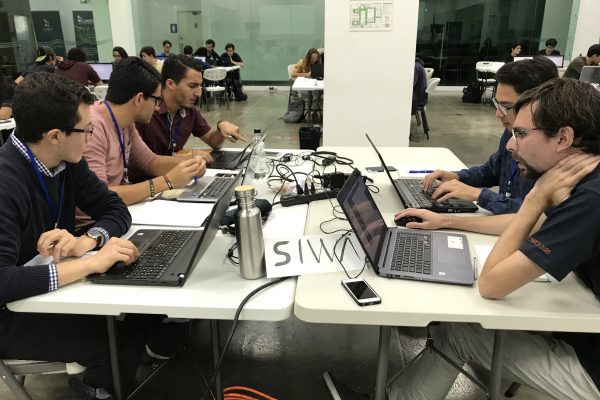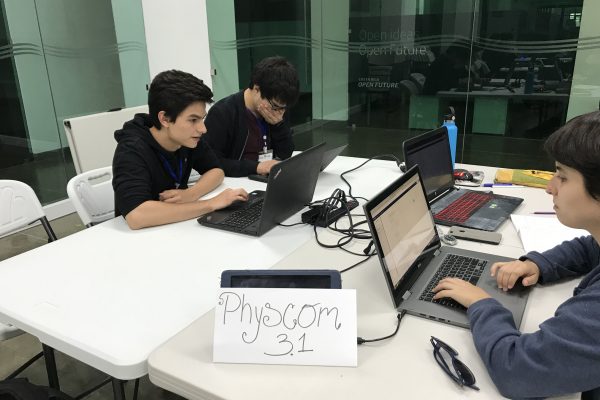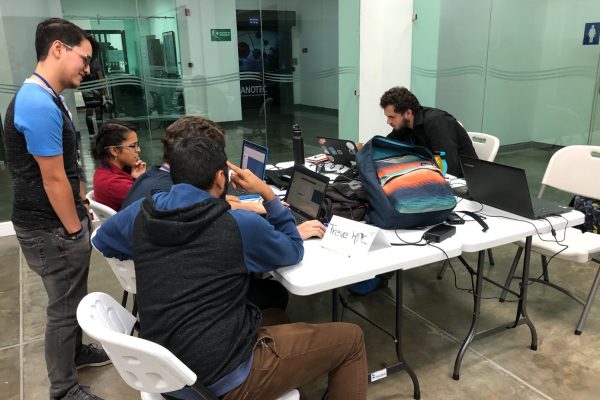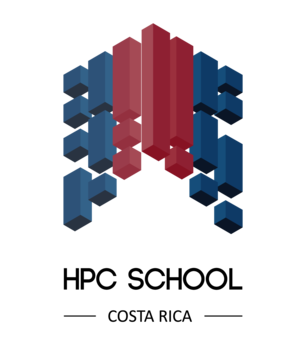
August
3rd to 6th
2021
(virtual event)
Costa Rica National High Technology Center
Dr. Franklin Chang Díaz building
1.3 km North of the US Embassy
Pavas, San José, Costa Rica
Topics:
- Parallel Computing
- Shared-memory Programming
- Distributed-memory Programming
- Scientific Visualization
High Performance Computing (HPC) is markedly changing the way we solve challenging problems in science, engineering, and society. From complex simulations to better understand the impact of climate change to sophisticated models to design effective drugs, HPC is a fundamental tool in accelerating time-to-discovery.
Building on the success of previous editions, the fifth installment of the Costa Rica High Performance Computing School (CRHPCS) aims at preparing students and researchers to introduce HPC tools in their workflows. A selected team of national experts will teach sessions on shared-memory programming, distributed-memory programming, and high performance computing.
We expect to continue with our mission to catalyze innovation through HPC with this event. Take advantage of this opportunity and join us for an exciting training.
Esteban Meneses, PhD
Advanced Computing Laboratory Director
Costa Rica HPC School General Chair
Keynote Speaker
Jorge Castro-Godínez

Biography:
Dr.-Ing. Jorge Castro-Godínez is an Assistant Professor at the School of Electronics Engineering, Costa Rica Institute of Technology. He was a scientist and PhD student at the Chair for Embedded Systems, Institute of Computer Engineering, Karlsruhe Institute of Technology, under the direction of Prof. Dr. Jörg Henkel, between 2015 and 2020. He received his Licenciatura (5-year engineering degree) and M.Sc. in Electronics Engineering from the Costa Rica Institute of Technology. Prior, he worked as Embedded Systems Engineer at Canam Technology Inc (2010-2012). He was also a Research Assistant at the Signal and Image Processing Lab and took part of a industry-joint research and development project with Bounce Imaging (2012-2014). He has been reviewer and additional reviewer for conferences such as DAC, ICCAD, DATE, CASES, CODES+ISSS, ASP-DAC, ASAP, and FPL; and journals such as IEEE TC, TCAD, TVLSI, TCAS-II and ESL. His primary research interest is in energy-efficient computing across the different abstraction layers, with a particular interest on approximate computing and efficient machine learning in edge computing.
Speakers
Raquel Miranda

Biography: Raquel Miranda is a computer engineer graduated from the Costa Rica Institute of Technology. She currently works at the Advanced Computing Laboratory at CeNAT, where she conducts research in data science. She is also co-director of Científicas de Datos Costa Rica and part of the steering committee of Women in Aerospace Costa Rica. She is interested in working on topics that involve gender, science, and technology.
Maripaz Montero
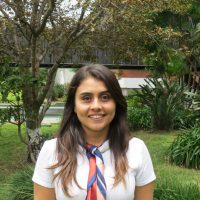
Biography:
Maripaz Montero is a biologist specialized in Biotechnology graduated from the National University of Costa Rica. She currently works at the Advanced Computing Laboratory at CeNAT, where she conducts research in Bioinformatics emphasised in the study of eukaryotic genomes. Currently she works in projects for the development of workflows for the assembly, annotation and functional analysis of the genomes, and the standardization of pipelines for the analysis of metagenomic data from different environments. Her research interests are the application of a multi-omic approach for the study of eukaryotic organisms, and the effects of the interactions of symbiotic relationships between insects and microorganisms in their genomes. Maripaz is the president of the WHPC Chapter Costa Rica.
Carlos Gamboa
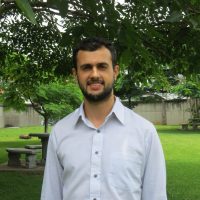
Biography:
Carlos Gamboa holds a Master’s degree in computing from the Costa Rica Institute of Technology. He works at the Advanced Computing Laboratory at CeNAT, where he conducts research in the analysis of the spread and characterization of fake news. He also performs as the advanced network lead in CONARE. His interests are research and education, academic networks, big data, and bioinformatics.
Instructors
Esteban Meneses
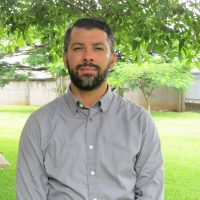
Biography: Esteban Meneses is the Director of the Advanced Computing Laboratory at the Costa Rica High Technology Center (CeNAT). He graduated from the PhD program in Computer Science from the University of Illinois at Urbana-Champaign. He spent two years at the Center for Simulation and Modelling at the University of Pittsburgh. He has more than 12 years of experience in HPC. His research interests include resilience in HPC systems, parallel programming models, and applications. He currently participates in two research efforts: developing a computational seismic platform to better characterize volcanic and tectonic activity, and building parallel computing simulations for plasma physics. Esteban will be in charge of teaching the distributed-memory programming lecture.
Diego Jiménez
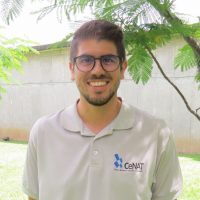
Biography: Diego Jiménez is a computer engineer graduated from the Costa Rica Institute of Technology. He currently works at the Advanced Computing Laboratory at CeNAT, where he conducts research in scientific computing and high performance computing. He has worked in projects of computational neuroscience and plasma physics applying parallel programming techniques to accelerate simulations. He has also studied the communication patterns present in large-scale MPI applications and their mappings to common interconnection topologies in high-performance computing. His research interests are: parallel programming paradigms and high performance computing. Diego will be in charge of teaching the Shared-Memory Programming sessions.
Mariela Abdalah
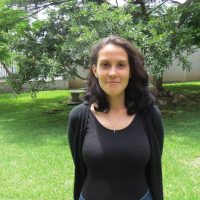
Biography: Mariela Abdalah is a Chemical Engineer graduated from the University of Costa Rica. She currently works at the Advanced Computing Laboratory at CeNAT, where she conducts research in scientific computing. She has worked in projects of computational meteorology and epidemiology, applying serial and parallel simulation codes for analysis and prediction in complex systems. Her research interests are: modeling, simulation and scientific computing. Mariela will be in charge of teaching the Distributed-Memory Programming sessions.
Luis Campos

Biography: Luis Campos holds a Master’s degree in computer science from the Costa Rica Institute of Technology. He works as a Senior Software Engineer at Prodigious. He has worked in projects of plasma physics applying parallel programming techniques and doing visualizations to confirm correctness of the simulation. His research interests are: scientific visualization, computer graphics, HPC, simulations. Luis will be in charge of teaching the Scientific Visualization sessions.
Pre-School Instructors
Sergio Moya
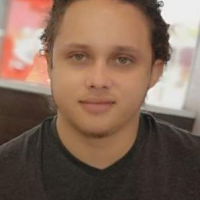
Biography: Computer engineer graduated from the Costa Rica Institute of Technology and student of the Programa de Posgrado en Ingeniería Eléctrica (PPIE) of the University of Costa Rica (UCR). He serves as a data scientist and as a research assistant at the Pattern Recognition and Intelligent Systems Laboratory (PRIS-Lab) in the UCR. Education is one of his greatest passions and he learned to program on his own at the age of 14.
Jean Carlo Umaña
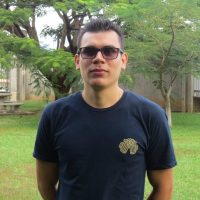
Biography: Jean Carlo is a computer engineer graduated from the Costa Rica Institute of Technology. He currently works at the Advanced Computing Laboratory at CeNAT, where he performs as the infraestructure lead and technical expert of the computer cluster Kabré. His interests are high performance computing, parallel architectures, and simulation.
Bryan Cervantes
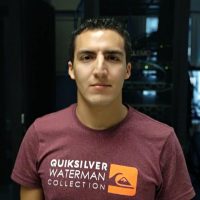
Biography: Bryan is an active Electrical Engineering student at University of Costa Rica, member of the Pattern Recognition and Intelligent Systems Laboratory and also founder and Chair of the IEEE UCR Computer Society Student Chapter, which objective is to encourage students to get involved in programming and computing extra-curricular activities to improve their technical abilities.
Topics
Parallel Computing:
We live in a parallel computer world. Literally. Think of all processors you have around, from the chip in your cell phone to the processor in your desktop computer. They all have multiple cores and possibly accelerators too. To unleash the full potential on all those devices, it is crucial to develop skills in parallel reasoning. How do you design a parallel program? What are the major concerns when running a concurrent code? We will discuss the fundamentals of parallel computing during an introductory lecture. Those principles apply throughout the broad spectrum of parallel architectures.
Shared Memory Programming:
Modern computer architectures are based on processors that have multiple cores. Thanks to chip manufacturing advances, shared-memory parallel computer systems have become relatively inexpensive and intended for general-purpose use. Being able to leverage that computing power is crucial to enhance the performance of scientific applications. In this half-day tutorial, we will explore the OpenMP application programming interface using a hands-on approach. This widely adopted standard enables the creation of shared-memory parallel programs and provides several features to maximize hardware resource utilization in modern parallel architectures.
Distributed Memory Programming:
Supercomputers these days are assembled by joining together multiple compute nodes through a high-speed interconnect. Such structure allows for scalable systems where even hundreds of thousands of nodes can be connected. At that extreme, it is fundamental to use the message-passing paradigm, a well-tested mechanism to write scalable scientific software. We will present MPI, the de-facto standard in HPC programming during a half-day tutorial. The Message Passing Interface (MPI) provides a list of functions to write complex codes and explore different data-partitioning strategies and parallel algorithms.
Scientific Visualization:
Data visualization generally divides into two classes – information visualization, which addresses the visualization of large sets of discrete data (the sorts of things typically stored in relational databases or spreadsheets) and scientific visualization, which addresses continuous space filling data represented on computational grids such as results from the simulation of physical processes (think weather or climate simulation, computational fluid dynamics or finite element analysis). This tutorial will address the latter, with particular attention to Paraview and VTK, which are used to visualize data on a wide range of scales spanning desktops to supercomputers. The tutorial will consist of half a day (or more) of introductory lectures on Paraview including basic principles and use, scripting and how and (more importantly why) we move to supercomputers.
Agenda
| DAY & TIME | Monday August 2nd | Tuesday August 3rd | Wednesday August 4th | Thursday August 5th | Friday August 6th |
| 10:00am – 12:00pm | Inauguration | Shared-memory Programming | Distributed-memory Programming | Scientific Visualization | |
| Keynote Presentation | |||||
| WHPC Presentation | |||||
| RedCONARE Presentation | |||||
| 12:00pm – 1:00pm | Lunch | ||||
| 1:00pm – 3:00pm | Parallel Computing | Shared-memory Programming | Distributed-memory Programming | Scientific Visualization | |
| Científicas de Datos Presentation | |||||
| Closure |
Material
Evaluation
Pre-School
We will offer onboarding sessions for those who would like to sharpen their C programming skills. Attendance to the pre-school is optional. The onboarding sessions will take place the following day:
Introduction to Linux OS/Kabré Supercomputer: Thursday July 29th, 2021, 10:00am-3:00pm
Introduction to C Programming Language: Friday July 30th, 2021, 10:00am-3:00pm
Resources
Download presentations at:
Registry
Tuition fee
Participation is free. There are no tuition costs associated with participating in this school for those affiliated to CONARE institutions.
Maximum quota
The maximum quota is 50 participants.
Important dates
Start of the application process to the School: July 2nd, 2021
Closure of the application process to the School: July 21st, 2021
Notification of acceptance/rejection to the School: July 23rd, 2021
Requirements

Have an intermediate English level (reading and listening). Some presentations and exercises may be in English.

Have intermediate programming skills (C/C++ desired, Python acceptable) and intermediate Linux handling.
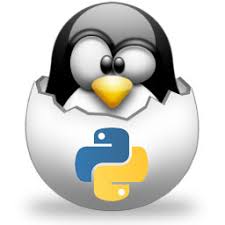
Sponsors
Sponsors

Supporters
Women in High Performance Computing (WHPC) is an organization that encourages women to participate in the HPC community by providing support and education to women and the places in which they work. This community has several chapters around the world, including Costa Rica.
This chapter aims to bring together women from all over the country who work in research and industry in HPC and related areas, to establish a community of collaboration and networking, through activities that increase the visibility of people within WHPC.
The National Council of University Presidents (Consejo Nacional de Rectores, CONARE) is the new national network of Costa Rica that replaces the National Network for Advanced Research, CR2Net, which operated from 2004 to 2006 as a consortium of institutions interested in taking advantage of advanced networks.
In 2008, as part of the CLARA meeting held in Rio de Janeiro on November 27 and 28, Alejandro Cruz, General Director of the National Center for High Technology (Centro Nacional de Alta tecnología, CeNAT) from Costa Rica, CONARE dependent entity, signed the reintegration of its country to RedCLARA and ALICE under the mission to contribute in solving national problems through research and science and technology transference, with the active participation of teams of researchers and graduate students from four state universities in Costa Rica, in together with other sectors of the country, including both government and the private sector.
Científicas de Datos CR is a social entrepreneurship that brings together women and men of different areas, ages, and regions of the country, interested on integrating data in their professions. Currently, 15 different disciplines coexist within the community. Among them you can find journalism, areas of the public sector, Library Science, Medicine, as well as a variety of STEM careers and others. Científicas de Datos CR promotes the inclusion, permanence, visibility, empowerment, and leadership of women in STEM careers.
Organizers
The Advanced Computing Laboratory (CNCA) at Costa Rica High Technology Center (CeNAT) is a multidisciplinary space where scientific discovery is accelerated through an advanced computing infrastructure. This infrastructure includes not only specialized and updated hardware, but also a set of efficient applications and well-trained staff in order to take advantage of all the technology. This allows CNCA to work in the main dimensions of research, project development, training, and services provision.
The Pattern Recognition and Intelligent Systems Laboratory (PRIS-Lab) is part of the School of Electrical Engineering at UCR. We seek the generation of scientific research and technological innovation, towards integration between the academic community, the government, the productive sector, the civil society and the environment, to improve people’s quality of life. The specific interests of PRIS-Lab are mainly (but not limited to) pattern recognition, intelligent systems, machine learning, data mining, digital signal processing, digital image processing, motion capture, biocomputation, abstract data structures, algorithms and programming.
Other Activities
Aknowledgements
The logo of Costa Rica HPC School was designed by Ing. D.I. María Cristina Vargas Del Valle.
Location
This event will be held virtually through Zoom platform. Details will be provided soon.

